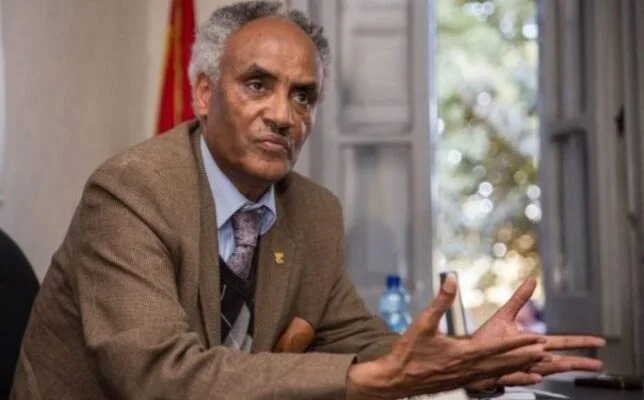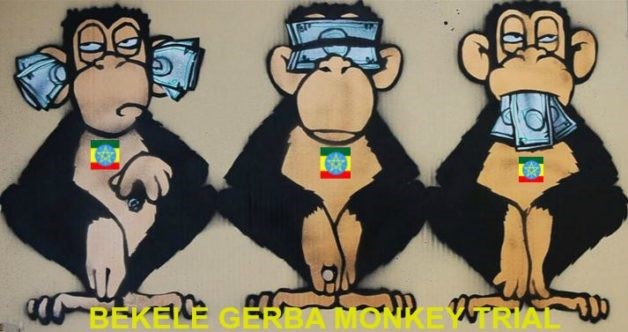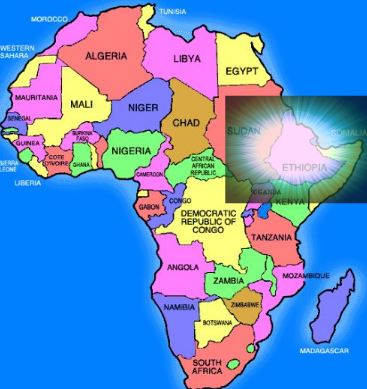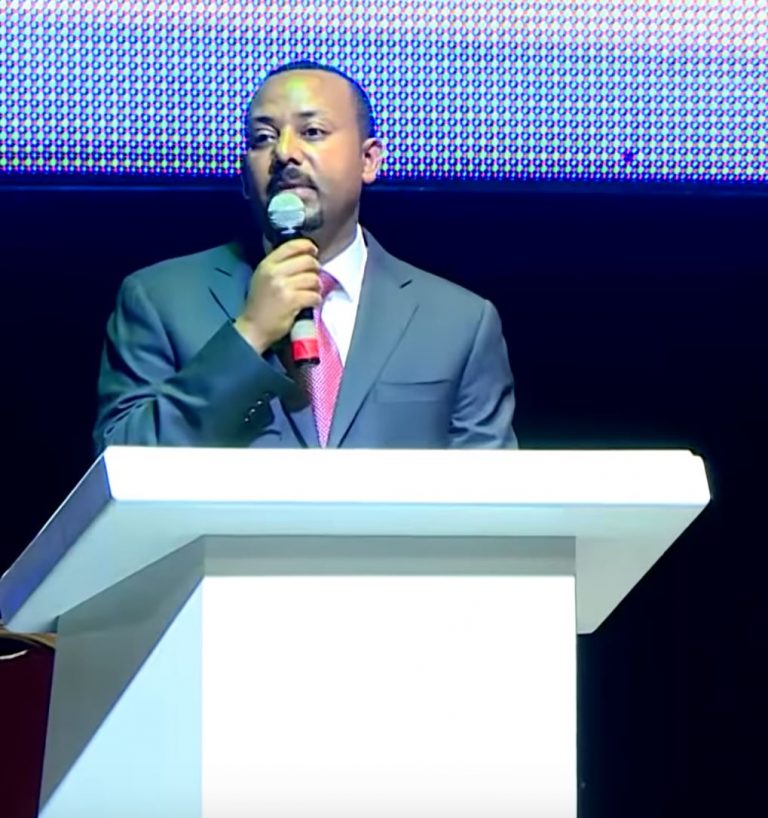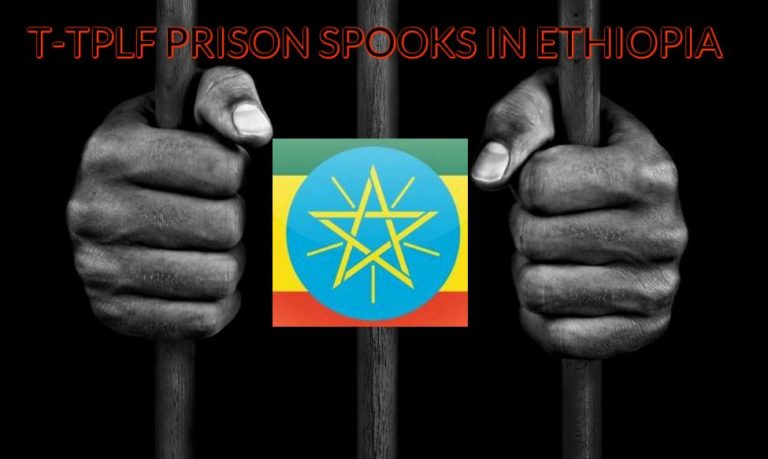Death by kangaroo court
Editorial
[Originally appeared in Ethiomedia]
http://www.ethiomedia.com/all/6050.html
Ethiomedia | June 2, 2008
A dictator and a mercenary
As a brutal dictator, Mengistu (left) lived violating the sovereignty of the people (1974-1991). As a ruthless mercenary, Meles Zenawi lives on violating the sovereignty of both the people and the country. What a mockery of justice! Meles Zenawi sending Mengistu Hailemariam and his lieutenants to the gallows for “serious crimes against humanity”! Imagine Adolf Hitler condemning Benito Mousollini to death for “war crimes against Ethiopians.” Imagine the pot calling the kettle black!
Meles, Inc. syndicate spokesman Yoseph Kiros this past week announced that Mengistu and 18 of his co-defendants have been sentenced to death because they “committed serious crimes against humanity.” Mengistu’s “conviction” arises from his Red Terror campaign (1977-78), described at the time by Human Rights Watch as “one of the most systematic uses of mass murder by a state ever witnessed in Africa.” Desta Gebru, a shady judicial hack in Meles, Inc., explained that the death sentences were imposed because Mengistu and his partners-in-crime “have tortured and executed thousands of innocent people in public, which applies as genocide according to Ethiopian law.”
The Pot Calling the Kettle Black
It does not appear much has changed in Ethiopia since 1977-78. The business of “torture, execution of thousands of innocent people and genocide” seems to be flourishing famously today. This is what Human Rights Watch says about Meles’ regime in 2008:
The Ethiopian government’s human rights record remains poor, both within the country and in neighboring Somalia… [Ethiopian] Government forces committed serious human rights violations, including rape, torture, and village burnings, during a campaign against Ethiopian rebels in eastern Somali Region…
In March and April 2007 in Mogadishu, Somalia, the Ethiopian military used heavy artillery and rockets indiscriminately, in violation of international humanitarian law, killing hundreds of civilians and displacing up to 400,000 people, as they fought an escalating insurgency…
In the five zones affected by the conflict [Somali region], the Ethiopian military retaliated by razing entire villages, carrying out public executions, raping and harassing women and girls, arbitrarily arresting, torturing and sometimes killing suspects in military custody; and forcing thousands to flee their homes…
In Oromia, Ethiopia’s most populous state, government authorities have used the fact of a long-standing insurgency by the Oromo Liberation Front (OLF) to imprison, harass, and physically abuse critics, including school children… Farmers in Oromia who fail to support the governing political party are denied fertilizer and other agricultural aids over which the government exercises monopoly control.
In 2003, Human Rights Watch reported the following on the massacre of the Anuaks:
A large number of [Ethiopian] troops from the 43rd Division were in Gambella town when the massacre began and Human Rights Watch estimates that over one hundred of them participated in the massacre. Adult Anuak men were the primary targets of the violence but were not its only victims. Soldiers raped several Anuak women, over four hundred Anuak houses were burned to the ground and huge numbers of civilians fled into the forest or took shelter in compounds belonging to two of the town’s largest churches. The commander of Gambella town’s military garrison, Major Tsegaye Beyene, was in Gambella town throughout the massacre and took no apparent action to stop it; indeed, he appears to have directly taken part in the violence…
As to Meles’ judicial machinery that produced death sentences for Mengistu and his henchmen, Human Rights Watch (2008) concluded:
The judicial system remains unable to assert independence in prominent cases. In the treason trial, for example, the trial judges showed little concern for defendants’ procedural and constitutional rights and ignored claims of serious mistreatment by prison authorities. With exceptions, courts generally allow police protracted periods to investigate for evidence that might support the charges brought by prosecutors; in the meantime, defendants remain jailed without an opportunity for release on bail.
And in 2006, the Inquiry Commission that Meles personally established to investigate the post-2005 elections violence, after hearing from 1,300 witnesses and examining 16,990 documents, accused Meles’ regime of massacring 193 unarmed innocent protesters, and wounding of 760 others. Commission Chairman Judge Frehiwot Samuel explained, “Many people were killed arbitrarily. Old men were killed while in their homes and children were also victims of the attack while playing in the garden.”
Justice Delayed, and Now Justice Denied to Innocent Victims
It took Meles 17 years to bring Mengistu, one of the most notorious criminals of the second-half of the 20th Century, to “justice”. But ironically Meles may have helped Mengistu evade justice for his unspeakable crimes yet again. We could imagine any number of plausible arguments Mengistu might raise to attack his “conviction”: 1) He could claim that he was convicted by criminals who have no legal or moral authority to try him. (In other words, stone cold-hearted criminals have no authority to try and convict other stone cold-hearted criminals.) 2) He could challenge his “conviction” on the grounds that those who “convicted” him are themselves guilty of the very same crimes for which he is given a death sentence; and that he would like to see the lot of them tried “for crimes against humanity.” 3) He could argue that he was convicted in a political show trial which took an incredible 17 years. Under no legitimate legal system could he be lawfully “convicted” after a “trial” of such absurd length. He may even embarrass Meles by claiming that Meles denied him his constitutional rights under Art. 20 of Meles’ constitution, which provides, “Everyone charged with an offence shall be entitled to a public hearing before an ordinary court of law without undue delay.”
But a “public hearing” that takes 17 years to produce “justice” is not flawed merely for “undue delay”. Justice that takes 17 years to arrive is not justice delayed; it is justice mocked, justice faked and justice scorned! It is ultimately JUSTICE DENIED to the thousands of innocent victims of Mengistu Hailemariam’s monstrous and ghastly crimes.
Mengistu’s Trial and Conviction in the Court of His Own Conscience
Mengistu and his accomplices have yet to be brought before a real court of law where their guilt is proven beyond a reasonable doubt just like any ordinary criminal. A botched conviction of these wicked and vicious criminals in a shoddy, sleazy and farcical kangaroo court will inevitably leave some shreds of lingering doubt about their guilt. Though we believe mightily in our hearts and minds that Mengistu & Co., are guilty as sin for the untold crimes they committed during the entire Derg-era (not just the Red Terror campaign), we also believe in the principle of the rule of law: True justice requires that even the repulsive Mengistu and his bloodthirsty gang of murderers must be brought to trial in a real court of law where their crimes are painstakingly documented and recorded not only to prove their guilt beyond a reasonable doubt, but also to preserve for future generations a complete record of the killing field that Ethiopia became under their oppressive misrule. But in all candor, we are heavy-hearted by the prospect that this reclusive and cagey criminal may now have escaped justice altogether because of the “conviction” in the kangaroo court of Meles Zenawi.
But we are not discouraged. For now, we are content to believe that Mengistu appears before a court of his own guilty conscience in his gilded country estate in Harare every day and night to answer charges brought against him by the ghosts of the thousands of innocent people he killed and tortured. It is a small measure of justice for us to believe — at least to comfort ourselves in the belief — that Mengistu, confined in his palatial villa alone, will have to look into the mirror of his own guilty conscience everyday and see the wretched monster that he truly is. But Mengistu and Meles should never forget: “Justice is like a train that is nearly always late,” but for the fiendishly wicked, justice always arrives in the nick of time.
Meles is Mengistu Redux
Mengistu and Meles are like peas in a pod, like Twiddle Dee and Twiddle Dum. The two are vampiric identical twins whose lust for shedding innocent blood is exceeded only by their bestial cruelty. During Mengistu’s bloody 17-year regime, hundreds of thousands of Ethiopians fell victim to his murderous campaigns, and the country was racked by corruption, rabid militarism and economic devastation. The signature legacy of Mengistu’s misrule remains to be the dubious honor given to Ethiopia as the international poster lady for famine, corruption and massive human rights violations. Isn’t that what Ethiopia has become today after 17 years of misrule by Meles? As they say, plus ça change, plus c’est la même chose. Or, the more things change the more they remain the same!
It is so written…
Scripture has a timeless message for the wicked hypocrites who sit in judgment of each other. In Matthew 7: 1-5, it is written:
Do not judge so that you will not be judged.
For in the way you judge, you will be judged;
And by your standard of measure, it will be measured to you.
Why do you look at the speck that is in your brother’s eye,
But do not notice the log that is in your own eye?
Or how can you say to your brother, ‘Let me take the speck out of your eye,’
and behold, the log is in your own eye?
You hypocrite, first take the log out of your own eye,
and then you will see clearly to take the speck out of your brother’s eye.
Meles, first take the log out of your own eye, and then you will see clearly to take the speck out of your brother Mengistu’s eye!
—
Beseferut qûna mesefer ayqerem.

